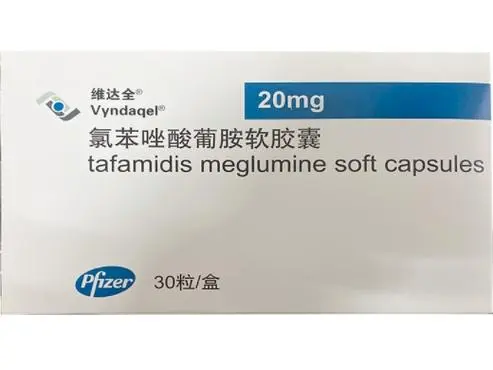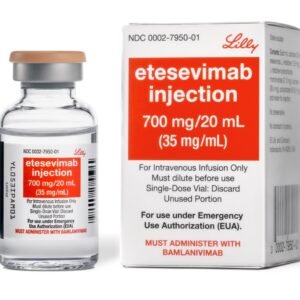维达全®/Vyndaqel®. Tafamidis Meglumine Soft Capsules.
Function and indication: This product is used to treat adult patients with stage I symptoms of transthyretin amyloidosis polyneuropathy to delay peripheral nerve function damage.
Usage and Dosage: Treatment should be initiated by a physician with experience in treating patients with transthyretin amyloidosis polyneuropathy (ATTR-PN) and should be carried out under his supervision. Dosage The recommended dose of clofazolin is 20 mg, once a day, orally. Clofazolin and clofazolin cannot be interchanged at 1 mg. If vomiting occurs after administration and the vomitus contains a complete clofazolin capsule, another clofazolin capsule should be taken orally as much as possible. If the vomitus does not contain a capsule, no additional medication is required, and the medication should be continued as usual the next day. Dosage Oral medication. Soft capsules should be swallowed whole and should not be crushed or chopped. This product can be taken on an empty stomach or after meals. Special populations Hepatic and renal impairment Patients with renal impairment or mild and moderate hepatic impairment do not need to adjust the dose. Data are limited for patients with severe renal impairment (creatinine clearance less than or equal to 30 mL/min). Tamiflu has not been studied in patients with severe hepatic impairment, so caution is recommended
Adverse Reactions:
Summary of Safety ProfileThe overall clinical data reflect exposure to 127 patients with transthyretin amyloidosis polyneuropathy (ATTR-PN) taking 20 mg tamiflu daily for a mean of 538 days (range 15-994 days). Adverse reactions were generally mild or moderate in severity. List of Adverse ReactionsAdverse reactions are listed by MedDRA system organ class (SOC) and standard convention frequency: very common (≥1/10), common (≥1/100-<1/10), and uncommon (≥1/1,000-<1/100). Within each frequency group, adverse reactions are listed in order of decreasing severity. The following table shows the incidence of adverse reactions in the Phase III, double-blind, placebo-controlled clinical study (Fx-005). System Organ Class (SOC) Very common infections and infestations Urinary tract infections Vaginal infections Gastrointestinal disorders Diarrhea Upper abdominal pain
Contraindications:
Contraindicated in patients with hypersensitivity to the active ingredient or any of its excipients.
Share:
Products
Our offers
Health Classification
Let us work together to protect precious health



























